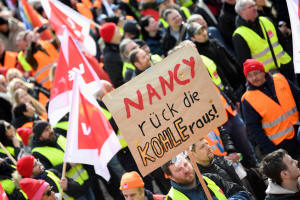Germany's 'very generous' pay deal may complicate ECB's inflation fight
 Send a link to a friend
Send a link to a friend
 [April 24, 2023] By
Francesco Canepa and Balazs Koranyi [April 24, 2023] By
Francesco Canepa and Balazs Koranyi
FRANKFURT (Reuters) - The "very generous" pay rise secured by Germany's
public sector workers may complicate the European Central Bank's fight
against inflation, analysts said on Monday.
The proposed deal will give 2.5 million employees in Europe's largest
economy a 5.5% permanent increase next year, on top of a series of
one-off payments over the next 12 months to help them deal with a surge
in the cost of living.
That will set an important precedent for other pay talks, and could
threaten the ECB's forecast that wage growth will peak this year, which
underpins its expectations for euro zone inflation to come back to the
central bank's 2% target by 2025.
"The permanent increase next year may raise some eyebrows at the ECB
because wages were supposed to peak this year," Natixis economist Dirk
Schumacher said.
Gilles Moec, chief economist at French insurer Axa, called the proposed
deal "very generous" and Mark Cus Babic, an economist at Barclays, said
it "could significantly increase aggregate wage growth".

The ECB projects that wage growth across the 20 countries that use the
euro currency will average 5.3% this year before declining to 4.4% next
year and 3.6% in 2025.
But the ECB's account of its March meeting shows this forecast was
challenged by some policymakers as too benign when it was presented to
them last month.
[to top of second column] |

A protestor holds a placard reading
'Nancy (Nancy Feser, German Minister of Interior) give us the money'
as people demonstrate in front of 'Landungsbruecken' at the harbour
during a nationwide strike called by the German trade union Verdi
over a wage dispute in Hamburg, Germany, March 27, 2023.
REUTERS/Fabian Bimmer

Holger Schmieding, chief economist at Berenberg, said the German
deal gave policy hawks at the ECB "another argument to raise key
rates at least twice more, and at least not to rule out a new 50
basis point move on May 4".
The ECB is widely expected to raise rates by a quarter of a
percentage point next week, slowing the pace of tightening due to
lingering uncertainty about the financial sector and lagged effects
from past increases in borrowing costs.
Other economists noted the German public sector pay agreement
followed a period of falling real wages, when prices grow faster
than salaries.
"Doves may argue that the deal comes after a period of wage
restraint and is reasonably front-loaded," Christian Schulz, an
economist at Citi, said.
Marcel Fratzscher, a former ECB economist who has since founded the
DIW think tank, estimated the deal will leave public sector workers
nursing a 6% drop in purchasing power by the end of next year,
assuming 6% inflation in 2023 and 3% in 2024.
"This means that it will probably take at least another five years
for public sector wages to recover this loss of purchasing power and
for employees to have the standard of living they had in 2021,"
Fratzscher said.
(Reporting By Francesco Canepa; Editing by Catherine Evans)
[© 2023 Thomson Reuters. All rights
reserved.]
This material may not be published,
broadcast, rewritten or redistributed.
Thompson Reuters is solely responsible for this content. |